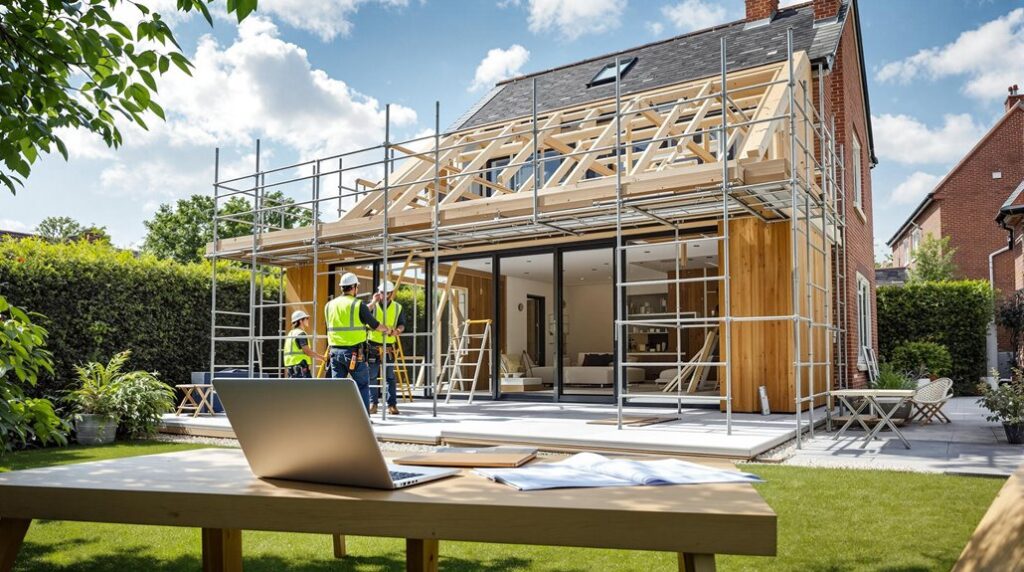I’ve analyzed the latest extension costs across the UK, and the numbers might surprise you—single-storey projects now start at £35,000, while double-storey extensions can hit £144,000. But here’s what most homeowners don’t realize: the quoted price is just the beginning. Hidden fees, regional variations, and material choices can dramatically shift your budget, and there’s one critical factor that’ll determine whether you’re looking at the lower or upper end of these ranges.
Key Takeaways
- UK home extensions cost £40,000-£143,581 on average, with pricing typically ranging from £1,800-£3,500 per square metre.
- Single-storey extensions average £35,000 while double-storey extensions cost around £144,000 for a 60m² space.
- Regional variations significantly impact costs, with London commanding up to £3,500/m² versus 15-25% lower prices in northern regions.
- Additional expenses include 20% VAT, planning fees (£26), building control approval (£600-£850), and architect costs (5-15% of budget).
- Budget an extra 25% beyond base construction costs for unexpected expenses and consider material choices affecting 40-60% of total spend.
Average Price Ranges for UK Home Extensions
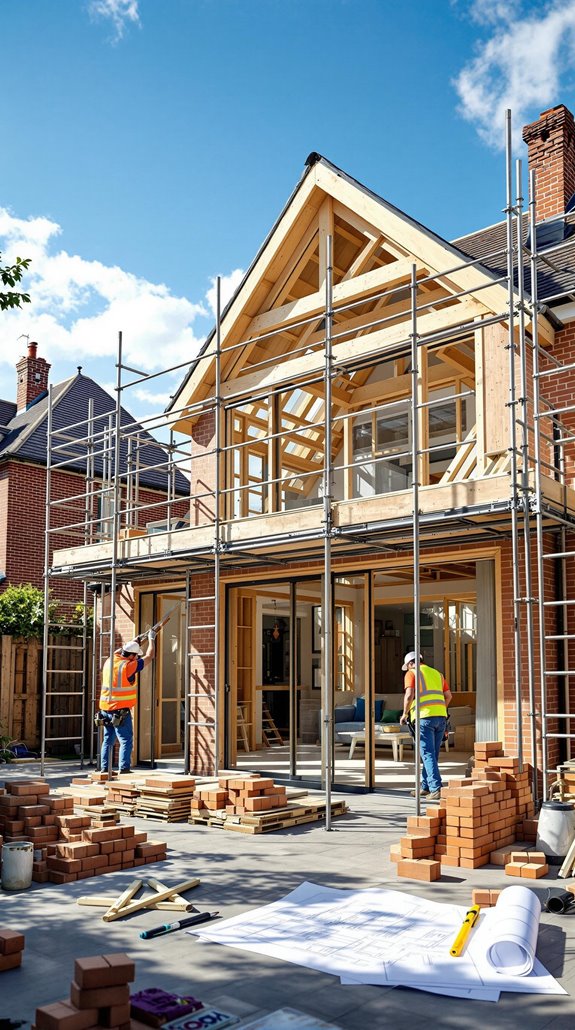
When planning a home extension, you’ll encounter notable cost variations across different sources and project types. I’ve found that average extension costs range dramatically, from around £40,000 for basic projects to £143,581 for extensive builds. The minimum you’re likely to spend is £124,191, while maximum costs can reach £173,574.
Per square metre pricing provides clearer guidance for budgeting. Most extensions cost between £1,800 and £3,500 per square metre, though single-storey projects typically fall within £2,200 to £3,300 per square metre. These variations reflect different project scopes, finish qualities, and regional factors. Utilizing an Extension Cost Calculator can help you estimate expenses accurately.
Understanding these ranges helps you set realistic expectations. Basic finishes start at £900 per square metre but can reach £1,700, while premium specifications push costs considerably higher across all project types. Ground-floor extensions represent the most common choice, with average costs reaching £86,686 or £2,890 per square metre.
Single-Storey Vs Double-Storey Extension Pricing
Choosing between single-storey and double-storey extensions greatly impacts your project budget and cost efficiency. Both options typically cost £1,800-£3,000 per square metre of floor space, with an average of £2,400 per square metre. However, the total project costs differ considerably.
Single-storey extensions average £35,000 for typical projects, while double-storey extensions cost around £144,000 for 60m² total floor area. The key advantage lies in maximising your footprint – double-storey extensions provide twice the living space on the same ground area without doubling foundation costs. Additionally, a well-planned extension can significantly increase your property value over time, making it a worthwhile investment.
You’ll share structural elements like foundations and external walls between floors, making double-storey extensions more cost-effective per square metre of ground used. Your choice of specification level – whether low, mid, or high spec finishes – will significantly influence the final project cost. Consider your long-term space needs when weighing the higher upfront investment.
Cost Breakdown by Extension Size and Square Footage
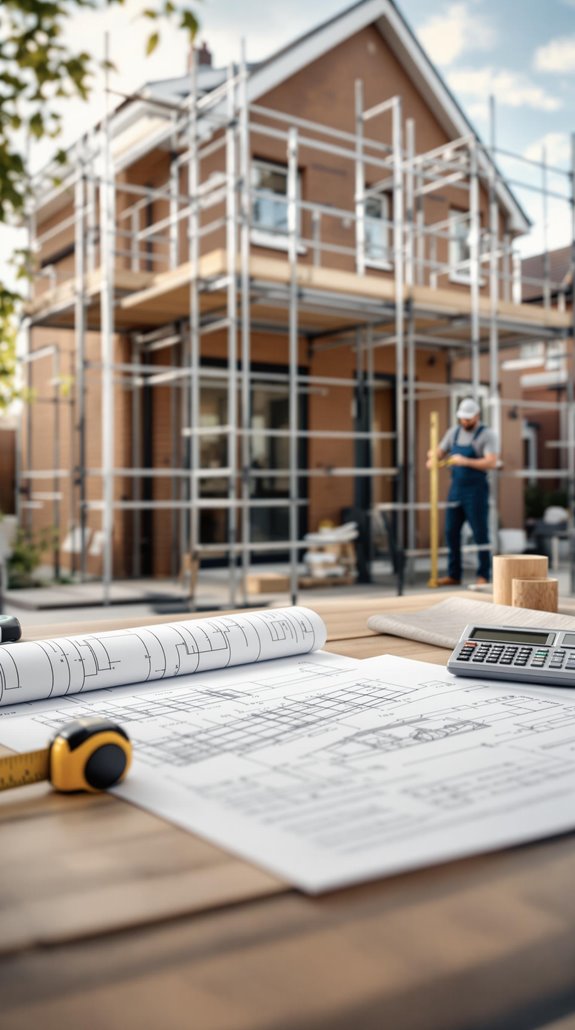
Extension costs vary dramatically based on your project’s size, with per-square-metre rates ranging from £900 for basic finishes to over £3,500 for high-specification builds. I’ll break down what you can expect for different extension sizes.
For a compact 15m² extension, you’re looking at £13,500-£25,500 for basic finishes or £33,000-£49,500 for standard specifications. It’s essential to ensure compliance with permitted development rights when planning your extension. Medium-sized 30m² projects cost £27,000-£51,000 basic or £66,000-£99,000 standard. Larger 50m² extensions range from £45,000-£85,000 basic to £110,000-£165,000 standard.
Remember that all these figures exclude the mandatory 20% VAT charge that applies to all labour and materials used in your extension project.
Basement Extensions and Premium Project Budgets
Basement extensions represent the most expensive type of home expansion, with costs typically ranging from £100,000 to £160,000 for a complete conversion. I’ll break down why these projects command premium budgets at £3,900 to £5,200 per square metre.
The high costs stem from complex groundwork including excavation and underpinning your existing foundations. Essential damp-proofing adds substantial expense, while limited site access increases labour costs considerably. Professional fees for architects, planning permission, and building regulations aren’t included in the per-square-metre figures. Additionally, regional variations in expenses can further influence the overall project costs.
You can manage costs by choosing reputable builders over the cheapest options, simplifying your design, and negotiating with contractors. Self-managing the project saves fees but requires strong organizational skills. Project management can reduce your overall expenditure by 15-25% on both labour and materials costs. Remember, premium finishes and additional features like kitchens or bathrooms will push your budget well beyond the baseline costs.
Garage Conversion Costs as Budget-Friendly Alternatives
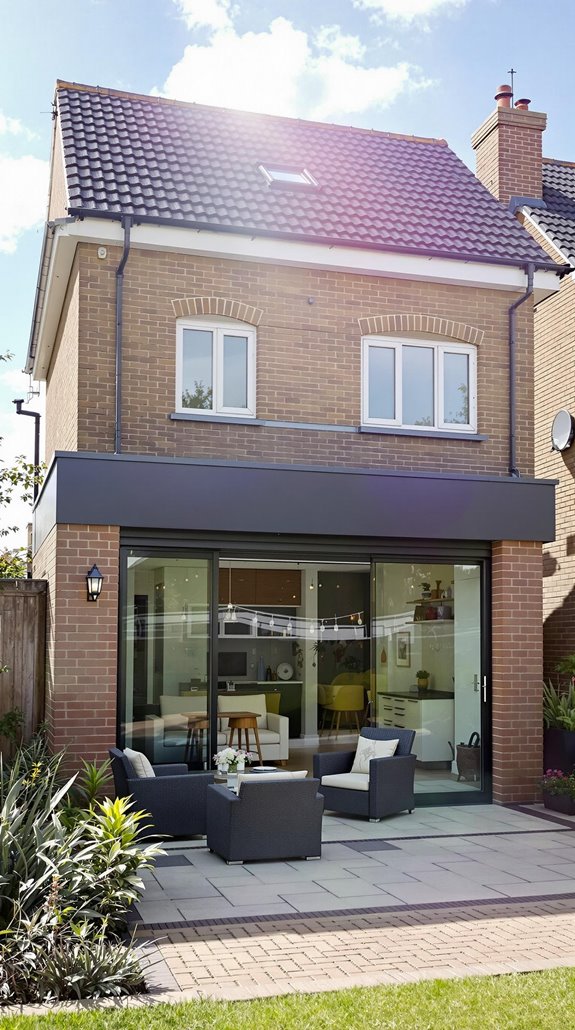
While basement extensions command premium budgets, garage conversions offer a cost-effective path to expand your living space at £7,500–£22,000 for single garages and £18,000–£60,000 for double garages. I’d recommend considering this option if you’re working with tighter budgets—you’ll typically spend 50–70% less than ground-floor extensions while completing projects in just 2–4 weeks.
Your conversion costs depend on garage type and desired finishes. Basic conversions average £14,500 for single garages, while double garages run around £32,000. You’ll see higher quotes when adding plumbing or electrical work for kitchens and bathrooms. Integral garages prove most economical since they’re already built into your home structure.
The real advantage? You’re utilizing existing structure without foundation work, and you’ll likely boost your property value by 10–20% while avoiding planning delays through permitted development rights.
Key Factors That Drive Extension Expenses Higher
Beyond conversion projects, several cost drivers can push your extension budget markedly higher than initial estimates. I’ve seen double-storey builds cost 20-30% more per square metre than single-storey alternatives due to structural complexity. If you’re considering premium finishes like natural stone, expect 25-50% higher costs versus standard options. Understanding local building regulations can also help you avoid unnecessary expenses that arise from non-compliance.
Complex designs with non-rectangular layouts add 15-25% to budgets, while basement extensions demand 40-60% more than above-ground builds. Ground conditions greatly impact costs—challenging clay soil can add £5,000-£15,000 for deeper foundations. Additionally, skilled labour costs have risen significantly and now account for 30-40% of your total project budget.
Location matters too. London rates exceed national averages by 20-35%, and limited site access increases costs by 10-25%. Conservation areas or listed buildings inflate budgets by 25-40% due to specialised requirements. Understanding these factors helps you plan realistic budgets.
VAT, Planning Permissions and Hidden Project Fees
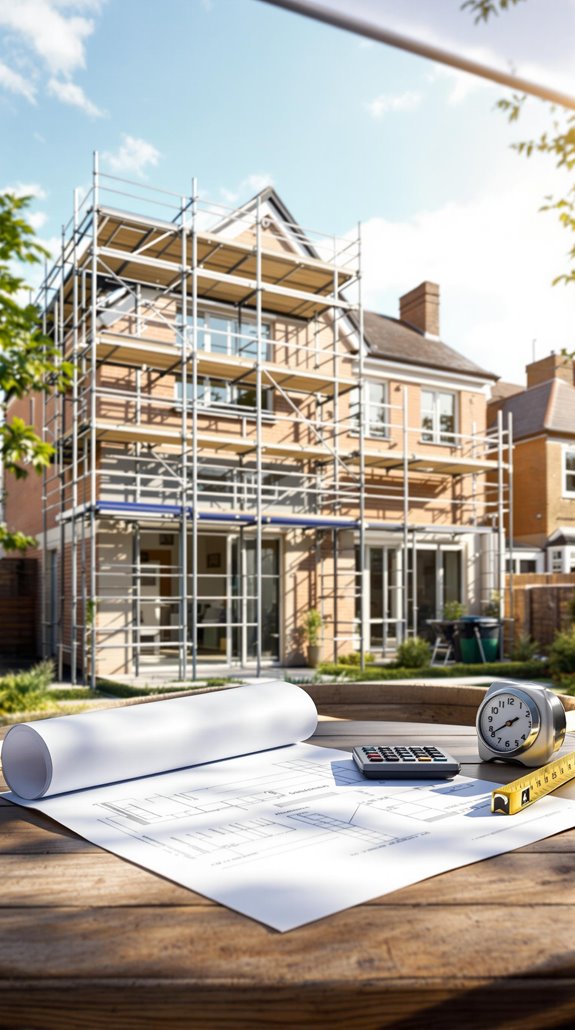
Although material and labour costs form the bulk of your extension budget, statutory fees and tax obligations can add substantial unexpected expenses to your project. You’ll face VAT at 20% on most building works and materials, though energy-saving materials qualify for the reduced 5% rate. Planning application fees typically cost around £26 in England, while building control approval ranges from £600 to £850 depending on your local authority and project complexity. It’s also crucial to be aware of permitted development rights to ensure your project stays within legal limits.
Don’t overlook professional fees either. Architect costs typically consume 5% to 15% of your total project budget, and you’ll need structural engineering calculations costing £500 to £1,500. Multiple building regulation inspections throughout construction add further expense. If your extension project pushes your building business turnover above £90,000 annually, you’ll need to consider mandatory VAT registration requirements. I’d recommend budgeting an additional 25% beyond your base construction costs to cover these statutory requirements and professional services.
Regional Price Variations Across the UK
Extension costs vary dramatically across the UK, with location often proving as significant a budget factor as your project’s size and specification. I’ve found London commands the highest prices, with per square metre costs reaching £3,500 for premium projects—that’s substantially above the national average of £2,395 per square metre. The Southeast follows closely, typically ranging from £2,400 to £3,200 per square metre, driven by proximity to London and elevated property values. Additionally, having adequate insurance coverage for your home extension can safeguard against potential risks associated with construction.
Moving north, you’ll discover more budget-friendly options. The Midlands generally aligns with national averages, while Northern England, Scotland, and Wales offer the most competitive rates—often 15-25% below London prices. These northern regions are experiencing significant economic expansion in cities like Newcastle and Leeds, which could influence extension demand and pricing in the coming year. Labour costs represent the primary driver of these regional variations, alongside local material transportation expenses and market demand for home improvements.
Material Selection Impact on Total Build Costs
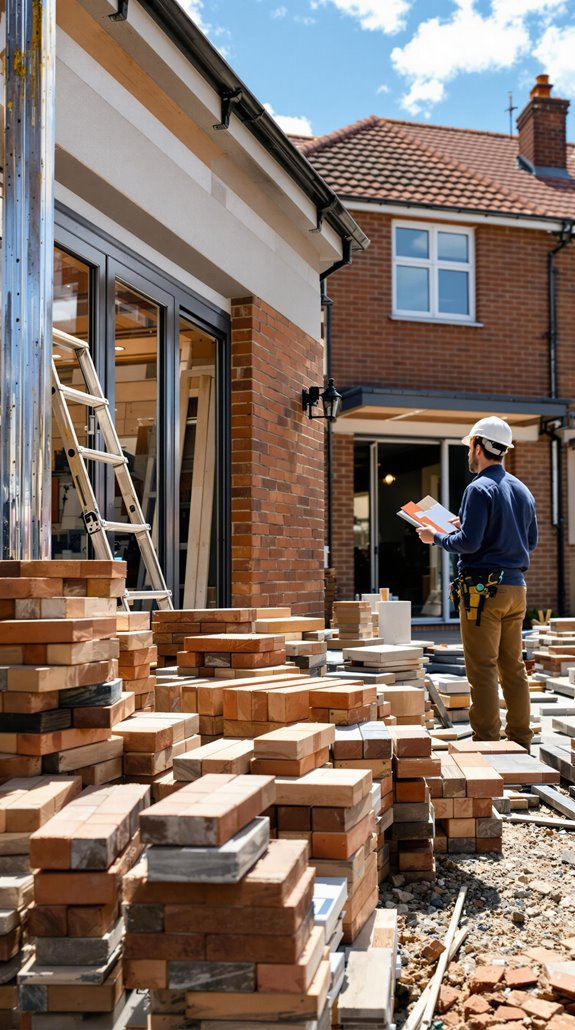
When selecting materials for your extension, you’re making decisions that’ll impact 40-60% of your total build budget—potentially shifting costs by over £1,000 per square metre between basic and premium choices. Adding a home extension can significantly boost property value, making the right material choices even more crucial.
I’ve seen flooring decisions alone create massive cost swings: vinyl at £7-£20 per m² versus hardwood at £17-£70 per m². Your heating system choice matters too—traditional radiators cost £60-£150 while underfloor heating runs £800-£1,500.
Kitchen materials deserve careful consideration. Budget units start at £50-£100 per unit, but custom solid wood reaches £200-£500. High-end countertops can add £5,000-£15,000 to your total. Remember that material quality directly correlates with long-term durability and maintenance requirements.
Return on Investment and Property Value Increases
While extension costs might seem intimidating, understanding the financial returns can shift your perspective entirely—you’re not just spending money, you’re potentially creating substantial equity in your property.
I’ve analyzed the numbers, and loft conversions consistently outperform other extension types, delivering 20-25% property value increases (£60,000-£75,000 for average UK homes) with positive ROI averaging +29% profit. Additionally, strategic extensions can further enhance your home’s appeal and functionality, leading to increased buyer interest. Rear extensions, despite adding 10-15% value, typically result in -25% net loss due to higher costs relative to returns.
Location dramatically impacts profitability—high-demand areas like London, Oxford, and Cambridge amplify returns by 15-30% due to space scarcity. However, properties in areas with ceiling prices may not yield positive returns on investment due to market limitations. Quality execution matters greatly; modern open-plan designs maximize appeal and resale value, while poor planning destroys potential returns.
Conclusion
I’d recommend budgeting at least 25% above your initial estimates to handle unexpected costs that’ll inevitably arise. Whether you’re considering a £35,000 single-storey extension or a £144,000 double-storey project, factor in regional variations, material upgrades, and professional fees early. Don’t forget VAT implications and planning permission costs. Compare extension costs against garage conversions if you’re working with tighter budgets—they’ll often deliver better value per square foot.
References
- https://www.homebuilding.co.uk/advice/how-much-does-an-extension-cost
- https://www.accenture.com/content/dam/accenture/final/accenture-com/document-3/Accenture-Tech-Vision-2025.pdf
- https://www.checkatrade.com/blog/cost-guides/house-extension-cost/
- https://spacy.io/usage/spacy-101
- https://nabc.org.uk/how-much-does-an-extension-cost-in-2023/
- https://buildpartner.com/how-much-does-it-cost-to-build-an-extension-in-2025-a-uk-guide/
- https://buonconstruction.com/cost-to-build-an-extension-uk/
- https://www.mwarchitectural.com/post/the-cost-of-building-a-home-extension-in-2025
- https://www.myjobquote.co.uk/costs/house-extension
- https://www.kt5construction.com/single-double-storey-extension-cost/

